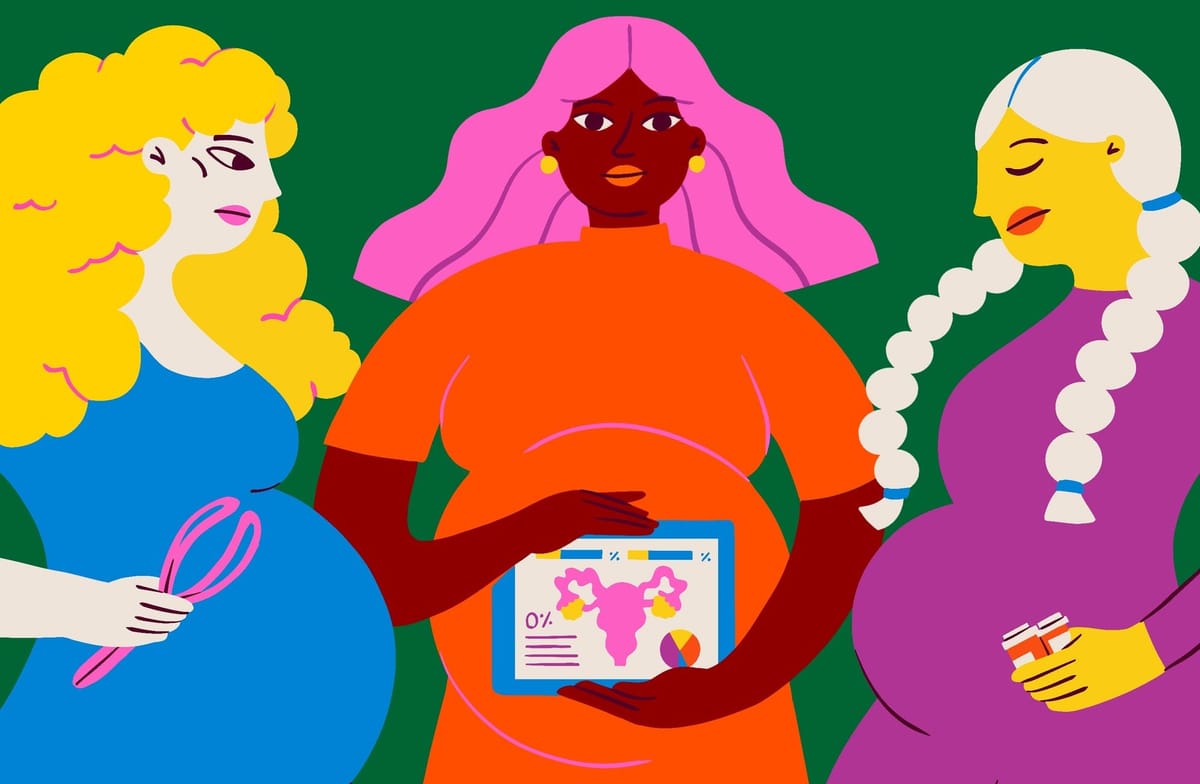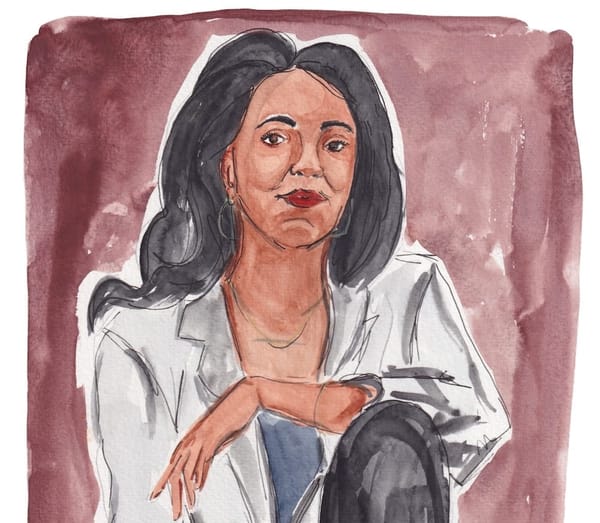Expectant Mothers Deserve More Options Than Just ‘Toughing It Out’
The swirl of misinformation around Tylenol and pregnancy points to a bigger problem: An overall reluctance to include pregnant women in medical research.

During my second pregnancy, in 2023, successive sinus infections caused me crippling headaches. My head pounded so painfully that my vision blurred and I could barely move. I needed a painkiller if I wanted to function. I had a job and another child to care for so I couldn’t stay in bed all day. Who can?
I’m no hypochondriac: The reality is pregnant bodies tend to get sick more frequently and differently. The immune system is suppressed to prevent the body from rejecting its new inhabitant, and when illness inevitably happens, widened blood vessels in the nose, dilated because the pregnant woman has up to 50% more blood than usual, create extra mucus. Which makes the congestion… horrifying.
Online searches forbade me from using nonsteroidal anti-inflammatory drugs like Advil and over-the-counter opioids, like codeine. But online searches told me that Tylenol (or paracetamol as we call it here in the U.K.) was just fine. And so that’s what I took—then spent the rest of my pregnancy terrified that I had irrevocably damaged my unborn child.
To treat or not to treat?
I was reminded of this last week, when, during a press conference with the U.S. Health and Human Services Secretary Robert F. Kennedy, Donald Trump told women to “tough it out” during their pregnancies rather than take acetaminophen. Trump claimed, “it can be associated with a very increased risk of autism.”
I’m no hypochondriac: The reality is pregnant bodies tend to get sick more frequently and differently.
Actually, a large and compelling body of evidence says just the opposite: That Tylenol’s risks to pregnant women and their unborn children are minimal. Most notably, a Swedish study published last year that examined almost 2.5 million children, found that using the medication was “not associated with children’s risk of autism, ADHD, or intellectual disability.”
A follow-up press release from the White House quoted Karoline Leavitt, the press secretary, saying that “the Trump Administration does not believe popping more pills is always the answer for better health.”
Sure. But not getting treatment when you need it, even if you’re pregnant, can lead to problems of its own.
And that raises a really big problem: For the most part—with the exception of a few drugs, including Tylenol—there isn’t a lot of research around which meds are safe for women in pregnancy because it’s not something that’s often studied.
Making sure meds are safe
Before we untangle that, let’s go back to the basics: How exactly do institutions decide who should be allowed which medications? Trump and RFK aside, health experts generally rely on not one or two studies (or even the three or four as the White House pointed to), but instead look to a large and compelling body of evidence, ideally, many large-scale studies that test a hypothesis, then test it again, then test it a few more times to ensure it’s water-tight. That’s the foundation on which health policy rests. Sometimes, they change policy as a result of new research that comes to light.
Of course, when it comes to pregnant women who need a pain killer or almost any medication (apart from Tylenol), that body of evidence is largely lacking. If you are pregnant, the general advice is “avoid taking meds if possible.” The trouble is, for women suffering from many conditions, whether epilepsy or asthma or depression and anxiety, avoiding treatment can be potentially life-threatening. A prolonged fever in pregnancy, for instance, is associated with a risk to the unborn child, meaning that the best thing you can do for your pregnancy is to take Tylenol to bring it down. It’s pretty clear-cut.
Trump’s misleading claims aside, all this raises the question: Shouldn’t we be testing medications on pregnant women—in a safe and carefully managed way of course—or, at least, figuring out a way to treat pregnant women when they need intervention as opposed to just shrugging it off like it’s just too difficult? Or too complicated? Or too costly? Or too whatever?

Covid vaccine panic revisited?
You may remember that back toward the start of the pandemic, pregnant women were advised not to get the Covid-19 vaccine, because it had not been adequately tested on that group. Nevertheless, scientists were able to quickly build a large body of evidence to show that the vaccine was OK for pregnant women.
But by the time the advice changed in 2021, the die had been cast: A 2022 study in the journal Vaccines found that only 27% of pregnant women in the U.S., U.K. and Japan were vaccinated (there aren’t comparable figures for the general population, although one figure showed that more than 90% of people over 12 in the U.K. had received at least one dose by January 2022). According to the British Medical Journal, this “confusion around vaccination during pregnancy” contributed to the deaths, from Covid, of 27 British women between 2019 and 2021.
Considering the fact that at one point, one in four women of reproductive age who were admitted to the hospital in the U.S. with Covid were pregnant, why wasn’t the vaccine tested on pregnant women sooner?
History has put drug companies off. Here in the U.K., the use of thalidomide, a drug prescribed in the late 1950s to treat morning sickness, kicked off one of the worst public health disasters in living memory: By the time it was removed from the market in 1961, around 100,000 babies were either stillborn or born with grave disabilities and birth defects caused by the medication.
There have been other scandals: Diethylstilbestrol (DES), for example, which was prescribed to women to prevent miscarriage for decades, was discovered to cause physical abnormalities and cancers in girls born to the women who took it. Sodium valproate, an epilepsy medication, has the dubious distinction of having generated its own syndrome, fetal valproate spectrum disorder (FVSD).

'We never want to harm two patients at once'
Clearly, it’s a complex issue, ethically and otherwise. But it’s also not impossible.
“We never want to harm two patients at once,” says Charis Chambers, M.D., an OB-GYN and chief medical officer at the period tracking app Clue. “And as a pregnant person, if someone said, ‘Oh, I have a study, there might be this medication, I want to just see how it affects you…well, who would sign up for that?”
Jennifer Boyle, M.D., an OB-GYN at Massachusetts General Hospital and an assistant professor at Harvard Medical School, agrees. “I still take care of many women who are at higher risk of vaginal cancer because their mothers took DES during pregnancy,” she says. “I think it’s reasonable to worry about exposing a pregnant woman and her baby to something that we aren’t extremely sure is safe.”
But for women who rely on medication to treat serious conditions, the fact that many of the drugs they use are not rigorously tested on pregnant bodies is a problem. In 2023 the British Pregnancy Advisory Service (BPAS), Britain’s answer to Planned Parenthood, published a report showing that even when drugs had been proven safe in pregnancy, women weren’t always getting them.
One participant in the BPAS study described her experience of trying to fill her prescription for anti-depressants as shaming and harrowing: “[The doctor] saw I was on antidepressants, and she made me feel like I was the world’s worst mother… She made me feel like, ‘You’re hurting your baby’... that was the point where I started to really decline in my mental health.”
“We need a paradigm shift,” says Jenna Beckham, M.D., an OB-GYN in Raleigh, N.C.
“We now have an evidence gap which is also harmful to pregnant patients,” she says. What is needed is “to include pregnant people in research safely and ethically, not exclude them by default.”

Slow, expensive—but worth it
You may be surprised to learn that there are examples of clinical trials that have involved pregnant women. In 2011, researchers at the University of Pittsburgh tested an HIV drug on women two hours before a scheduled c-section. The goal was to see if the drug crossed the placenta (it didn’t), while minimizing exposure to the women’s babies. After they had determined that the drug didn’t harm unborn children, the scientists tried it on women who were 37 to 39 weeks pregnant. Then again, on women who were at 34 to 36 weeks. This is a slow, expensive approach—but for people who rely on these medicines, it makes all the difference.
The University of New South Wales’ National Drug and Alcohol Research Centre (NDARC) takes a different approach. They use data gathered from doctors, pharmacies and hospitals to put together large sets of “real-world data,” meaning they review the results from pregnant women who used the medication while pregnant. They found that the use of certain painkillers including opioids and specific drugs used to help people give up smoking did not lead to congenital abnormalities in their babies.
Controlling women and their bodies—once again
Of course, to a government seeking to control women’s bodies, none of these arguments really matter. The White House’s dismissive language about “popping pills” says it all. As the best-selling author and OB-GYN Dr. Jen Gunter pointed out on her Substack shortly after Trump’s condemnation of Tylenol: “Fascists are obsessed with purity and cleansing.” To them, medications like Tylenol are “spoiling the purity of pregnancy,” she wrote.
It’s not just in the U.S. that this view permeates. On the morning I finished this piece, I had coffee with a pregnant friend who had been denied aspirin, a medication she needed to maintain her pregnancy, by a pharmacist that very morning. “It’s not safe for pregnant women,” the pharmacist told her. “It is,” my friend replied, showing her the NHS website, which says it is safe, along with a letter from her midwife. But the pharmacist continued to deny her this vital medication, accusing her of “lying.”
Dr. Gunter’s reference to the “purity of pregnancy” is part of a larger myth, one that’s being foisted on women by the wellness industry, the Christian right-wing, not to mention my friend’s pharmacist: that pregnancy transforms women’s bodies into something unknowable and other-worldly. It’s why women are so often urged to reject medical intervention at birth, too. As the thinking goes, women’s bodies should be able to give birth unassisted, pushing the baby out through the magical, mystical power of being a life giver. In other words, stop “popping pills” and just “tough it out.”
We need to get over the idea that pain is a moral failing, says Beckham. “It’s a clinical symptom.”
And pregnant women’s bodies are still bodies.
Sometimes, those bodies feel pain. Sometimes, they need to take a Tylenol—a medicine that has been proven, again and again, to be safe in pregnancy—so they can get on with their day and live their life.
Want to share this story? Here's a link!








